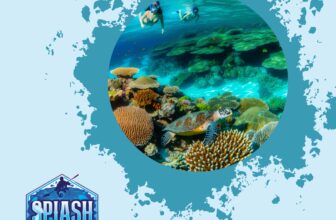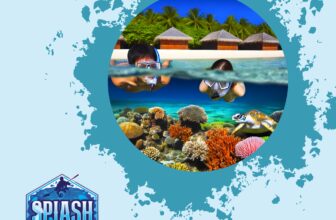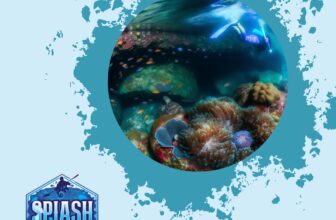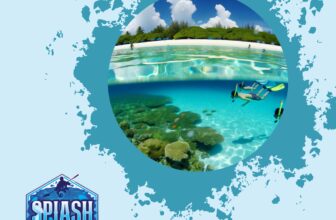
When it comes to water activities, snorkeling and scuba diving are two of the most popular. Both activities involve exploring underwater worlds, but there are significant differences between them.
Snorkeling is a surface-level activity that allows people to explore underwater environments without diving deep beneath the surface. On the other hand, scuba diving involves descending into deeper water with specialized equipment, allowing for extended underwater exploration.
What is Snorkeling?
Snorkeling is an activity that requires little to no training or certification. The primary equipment needed for snorkeling includes a mask, snorkel tube, and fins. These tools allow swimmers to see underwater while breathing through a tube without having to submerge their entire bodies in water.
One of the main benefits of snorkeling is its simplicity. Unlike scuba diving which can require extensive training and certification processes, anyone can try snorkeling with minimal preparation or guidance.
What is Scuba Diving?
Scuba diving involves more advanced equipment such as a buoyancy control device (BCD), regulator, tanks and fins. These tools allow divers to explore deeper waters for longer periods than with traditional snorkel gear. While scuba diving can be thrilling, it also requires specialized training and certification due to potential risks associated with deep-sea diving including decompression sickness (the bends).
The Importance of Knowing the Difference
Knowing the difference between these two activities will help you make informed decisions about what kind of experience you want when exploring underwater environments. Understanding what each activity entails will guide you on which gear you should have in order to execute your plans successfully.
Additionally, understanding these differences can help prevent accidents or unfortunate situations from occurring since both activities require one to be present in a potentially dangerous environment. It is crucial to understand the risks associated with each activity and to take necessary precautions while exploring the waters.
Whether you’re a beginner or an experienced water adventurer, understanding the difference between snorkeling and scuba diving is important for an enjoyable experience. Both activities have their place in underwater exploration – it’s up to you which one best fits your needs.
Snorkeling: The Joy of Observing Marine Life from Above
Snorkeling is a popular activity that allows people to explore the underwater world without needing any certification or special training. It involves swimming on the surface of the water while wearing a snorkel mask and fins, which enables you to breathe through the snorkel tube and see clearly underwater.
Definition and Equipment Needed
To go snorkeling, you need some basic equipment such as a snorkel mask, fins, and a snorkel tube. The mask should fit comfortably on your face and provide an airtight seal around your eyes so that you can see clearly underwater without any water entering your eyes.
Fins help in propelling you forward while reducing fatigue in your legs. A snorkel tube allows you to breathe through your mouth while keeping your face submerged in water.
Benefits of Snorkeling
One of the benefits of snorkeling is that it’s an affordable way to explore marine life without needing specialized equipment or training. As long as you know how to swim, you can enjoy this activity almost anywhere with clear waters such as beaches, coral reefs, or even swimming pools. Snorkeling also helps in reducing stress by immersing yourself in nature’s beauty and improving overall physical fitness by providing cardiovascular exercise.
Limitations of Snorkelling
While snorkeling is an enjoyable activity that almost anyone can do, there are some limitations to consider. For one thing, it only allows observation from above so it won’t take you deep into the ocean like scuba diving does. Another limitation is its duration because staying too long with your face submerged can cause discomfort and strain on your neck muscles due to prolonged use of the snorkel tube.
Snorkeling has limited access to certain marine life such as fish hiding under rocks where divers can reach them. Overall, snorkeling is a perfect starting point for anyone interested in exploring the underwater world without the need for certification or specialized training.
Scuba Diving
Scuba diving is a more advanced form of underwater exploration that requires specialized equipment, training, and certification. Scuba diving allows you to dive deeper and stay underwater for longer periods compared to snorkeling. The acronym “scuba” stands for self-contained underwater breathing apparatus – a term coined by Jacques Cousteau, a pioneer in the field of scuba diving.
The Equipment Needed
To scuba dive safely, you need specialized equipment that enables you to breathe underwater while controlling your buoyancy. This includes a scuba tank filled with compressed air and a regulator that delivers air from the tank to your mouthpiece, fins for propulsion, a buoyancy control device or BCD that lets you adjust your position in the water column, and a weight system to help compensate for your natural buoyancy. Additionally, divers may use other optional equipment such as dive computers, surface marker buoys (SMBs), reels or spools for navigation purposes.
The Benefits of Scuba Diving
Scuba diving offers several benefits beyond the thrill of exploring the underwater world. For one thing, it’s an excellent form of exercise that engages many muscle groups and improves cardiovascular fitness.
It’s also an opportunity to see marine life up close in their natural habitat – an experience like no other! Moreover, scuba diving can help reduce stress levels by promoting relaxation and mindfulness while immersed in nature.
The Limitations of Scuba Diving
While scuba diving is undoubtedly exciting and rewarding, it also comes with some limitations worth considering before taking up this activity. Firstly, it can be costly compared to snorkeling due to the required equipment purchases or rentals as well as training fees if you’re not certified yet.
Secondly, there may be physical limitations to diving, such as medical conditions or age restrictions that prevent some people from participating. Thirdly, the risk of decompression sickness (also known as ’the bends’) increases with depth and dive time and can lead to potentially serious health effects.
Scuba diving requires cautious approach and adherence to safety protocols to minimize accidents due to equipment failure or human error. Despite these limitations, scuba diving can be an incredible experience for those who are willing and able to take it on!
Key Differences Between Snorkeling and Scuba Diving
Depth Limitations
One of the most significant differences between snorkeling and scuba diving is the depth limitation. Snorkeling is primarily done on the surface, where one can breathe through a snorkel or a tube attached to an air supply on the surface.
In contrast, scuba diving allows divers to explore deeper depths, with some recreational dives being as deep as 130 feet. However, it’s important to note that going too deep can be dangerous, requiring specialized training and equipment.
Duration Limitations
Another key difference between the two is how long one can stay underwater. Snorkelers must come up for air regularly since they are breathing through a tube attached to an air supply on the surface. Meanwhile, scuba divers carry their air supply on their backs in tanks that allow them to stay underwater for extended periods without surfacing for air.
Equipment Differences
Snorkeling requires minimal equipment compared to scuba diving’s extensive gear requirements. For snorkeling, you only need a mask, snorkel, fins and possibly a wetsuit depending on water temperature. On the other hand, scuba divers require much more equipment such as a wetsuit or drysuit depending again on water temperature but also things like tank(s), regulator(s), buoyancy control device (BCD), dive computer and depth gauge among others.
Certification Requirements
Certification requirements are another critical difference between snorkeling and scuba diving. Anyone can go out and try snorkeling without any special training or certification. Conversely, scuba diving requires certification from recognized organizations such as PADI (Professional Association of Diving Instructors) or SDI (Scuba Diving International).
Obtaining certification involves both classroom instruction and practical training. This is to ensure that divers have the necessary knowledge and skills to dive safely and minimize the risks associated with scuba diving.
Conclusion
After discussing the main differences between snorkeling and scuba diving, it’s clear that both activities have their own unique benefits. Snorkeling is a great way to explore shallow waters and observe marine life without the need for extensive equipment or training. On the other hand, scuba diving allows you to explore deeper waters, stay underwater for longer periods of time, and get up close with marine life in their natural habitat.
If you’re a beginner, we recommend starting with snorkeling before venturing into scuba diving. This will give you a chance to get comfortable in the water and build up your skills and confidence before tackling the more challenging aspects of scuba diving.
Ultimately, whether you choose snorkeling or scuba diving as your preferred activity depends on your personal preferences and goals. Both offer unique opportunities to explore the beauty of our underwater world and can provide unforgettable experiences in nature.
The Importance of Protecting Our Oceans
As we wrap up this article on snorkeling vs scuba diving, it’s important to note that both activities rely heavily on our ocean’s health for them to be enjoyable experiences. As humans continue to pollute our oceans with plastic waste, harmful chemicals, and overfishing practices, we risk destroying fragile ecosystems that support a wide range of marine life. In order for us to continue enjoying activities like snorkeling and scuba diving for years to come, it’s essential that we take action to protect our oceans.
This can include reducing our use of single-use plastics like straws and bags or supporting organizations that work towards ocean conservation efforts. By taking small steps towards preserving our oceans today, we can ensure future generations will have access to these amazing underwater worlds.







